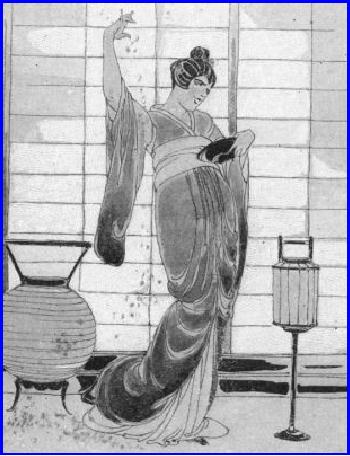 |
WOMAN COSTUMED FOR HER WAR JOB |
| << MODELS |
| IN CONCLUSION >> |

white
chiffon (Empire lines), a
very small, deep pinkish-red
rose had a white rose-
bud
bound close to it with a bit of
blue ribbon. This was placed
under the bertha of
cobweb
lace, and demurely in the
middle of the short-waisted
bodice. Again a robe
d'interior
of white satin charmeuse, had a
sleeveless coat of blue, reaching to
knees,
and a
dashing bias sash of
pinkish-red, twice round the
waist, with its long
ends
reaching
to skirt hem and heavily
weighted.
Not
at once, but only gradually,
did it dawn upon us that
most of the gowns bore,
in
some
shade or form, the tricolour
of France!
CHAPTER
XXVIII
WOMAN
COSTUMED FOR HER WAR JOB
VERY
now and
then a sex war is predicted, and
sometimes started,
usually
by woman, though some
predicted that when the
present
European
war is over and the
men come home to their
civilian tasks, now
being
carried on by women, man is
going to take the initiative, in
the sex
conflict.
We doubt it. Without deliberate design to
prove this point,--that
a
complete
collaboration of the sexes
has always made the
wheels of the
universe
revolve,
many of the illustrations
studied showed woman with
man as decoration,
in
Ancient Egypt, Greece, and
during later periods.
The
Legend of Life tells us that
man can not live alone,
hence woman; and the
Pageant
of Life shows that she
has played opposite with
consistency and success
throughout
the ages.
The
Sunday issue of the
Philadelphia Public
Ledger for
March 25, 1917, has
a
headline,
"Trousers vs. Skirts," and,
continues Margaret Davies,
the author of the
article:
"This
war will change all things
for European women.
Military
service, of a sort, has come
for them in both
France
and
England, where they are
replacing men employed
in
clerical
and other non-combatant departments,
including
motor
driving. The moment this was
decided upon in
England,
it
was found that 30,000
men would be released for
actual
fighting,
with prospects of the
release of more than
200,000
more.
What the French demand will be is
not known as I
write,
but it will equal that of
England.
"How
will these women dress? Will
they be given
military
uniforms
short of skirt or even
skirtless? Of course they
won't;
but
the world on this side of
the ocean would not
gasp should
this
be done. War industry
already has worked a
revolution.
"Study
the pictures which accompany
this article. They are
a
new
kind of women's 'fashion
pictures'; they are
photographs
of
women dressed as European
circumstances now
compel
them
to dress. Note the trousers,
like a Turkish woman's,
of
the
French girl munitions
workers. Thousands of girls here
in
France
are working in such
trousers. Note the smart
liveries of
the
girls who have taken
the places of male carriage
starters,
mechanics
and elevator operators, at a great London
shop.
They
are very natty, aren't
they? Almost like costumes
from a
comic
opera. Well, they are
not operatic costumes. They
are
every-day
working liveries. Girls wear
them in the most
mixed
London
crowds--wear them because
the man-shortage
makes
it
necessary for these girls to
do work which skirts do not
fit.
All
French trams and buses have
'conductresses.'
"The
coming of women cabmen in London is
inevitable--
indeed,
it already has begun. In
Paris they have
been
established
sparsely for some time and
have done well, but
they
have not been used on
taxis, only on the horse
cabs.
"I
have spent most of my time in
Paris for some months
now,
and
have ridden behind women
drivers frequently. They
drive
carefully
and well and are much kinder
to their horses than
the
old,
red-faced, brutal French coch�rs
are. I like them.
They
have
a wonderful command of language,
not always entirely
or
even partially polite, but
they are accommodating and
less
greedy
for tips than male
drivers.
"At
Selfridge's great store--the largest and
most progressive
in
London, operated on Chicago
lines--skirtless maidens are
not
rare enough to attract undue
attention. The first to be
seen
there,
indeed, is not in the store at all,
but on the sidewalk,
outside
of it, engaged in the gentle
art of directing
customers
to
and from their cars and cabs
and incidentally keeping
the
chauffeurs
in order.
"An
extremely pretty girl she
is, too, with her
frock-coat
coming
to her knees, her top-boots
coming to the coat, and
now
and then, when the wind
blows, a glimpse of loose
knickers.
She tells me that she's
never had a man stare at
her
since
she appeared in the new
livery, although women
have
been
curious about it and even
critical of it. Women have
done
all
the staring to which she
has been subjected.
"Within
the store, many girls
engaged in various special
employments,
are dressed conveniently for
their work, in
perfectly
frank trousers. Among these
are the girls
who
operate
the elevators. There is no
compromise about it.
These
girls
wear absolutely trousers
every working hour of
every
working
day in a great public store, in a great
crowded city,
rubbing
elbows (even touching
trousered knees,
inevitably)
with
hundreds of men
daily.

PLATE
XXXIII
Madame
Geraldine Farrar. The value
of line
was
admirably illustrated in the
opera
"Madame
Butterfly" as seen this
winter at the
Metropolitan
Opera House. Have
you
chanced
to ask yourself why the
outline of the
individual
members of the chorus was so
lacking
in charm, and Madame Farrar's so
delightful?
The great point is that in
putting
on
her kimono, Madame Farrar
kept in mind
the
characteristic silhouette of the
Japanese
woman
as shown in Japanese art;
then she
made
a picture of herself, and one in
harmony
with
her Japanese setting. Which
brings us
back
to the keynote of our
book--Woman
as
Decoration--beautiful
Line.
Sketched
for "Woman as Decoration"
by
Thelma
Cudlipp
Mme.
Geraldine Farrar in Japanese
Costume
as
Madame Butterfly
"And
they like it. They
work better in the new
uniforms than
they
used to in skirts and are
less weary at each day's
end. And
nobody
worries them at all. There
has not been the
faintest
suspicion
of an insult or an advance from any one
of the
thousands
of men and boys of all
classes whom they
have
ridden
with upon their 'lifts,'
sometimes in dense crowds,
sometimes
in an involuntary t�te-�-t�te.
"Other
employments which girls
follow and dress
for
bifurcatedly
in this great and progressive store are
more
astonishing
than the operation of
elevators. A charming
young
plumber
had made no compromise whatever
with tradition.
She
was in overalls like boy
plumbers wear, except that
her
trousers
were not tight, but
they were well fitted. A
little cap
of
the same material as the
suit, completed her jaunty
and
attractive
costume. And cap and suit
were professionally
stained,
too, with oil and things
like that, while her
small
hands
showed the grime of an
honest day's competent,
hard
work.
"The
coming summer will see an
immense amount of
England's
farming done by women and, I
think, well done.
Organisations
already are under way
whereby women propose
to
help decrease the food
shortage by intelligent increase
of
the
chicken and egg supply, and
this is being so well
planned
that
undoubtedly it will succeed. Eggs and
chickens will be
cheap
in England ere the summer
ends.
"I
have met three
ex-stenographers who now are
at hard work,
two
of them in munition factories
(making military engines of
death)
and one of them on a farm. I asked
them how they
liked
the
change.
"'I
should hate to have to go back to
work in the old
long
skirts,'
one replied. 'I should hate to go back to
the old days of
relying
upon some one else for
everything that really
matters.
But--well,
I wish the war would
end and I hope the
casualty
lists
of fine young men will not
grow longer, day by day,
as
Spring
approaches, although everybody
says they will.'
"Mrs.
John Bull takes girls in
pantaloons quite calmly
and
approvingly,
now that she has
learned that if there are
enough
of
them, dad and the boys will
pay no more attention to
them
in
trousers than they would
pay to them in
skirts."
We
have preferred to quote the
exact wording of the
original article, for the
reason
that
while the facts are
familiar to most of us, the
manner of putting them could
not,
to
our mind, be more graphic.
Some day, when the
Wateaus of the future
are
painting
the court ladies who again
dance pavanes in sunlit glades,
wearing wigs
and
crinoline, such data will
amuse.
That
the women of Finland make
worthy members of their parliament
does not
prove
anything outside of Finland.
That the exigencies of the
present hour in
England
have made women equal to
every task of men so far
entrusted to them,
proves
much for England. Women,
like men, have untold,
untried abilities
within
them,
women and men alike are
marvellous under fire--capable of
development in
every
direction. What human nature
has done it can do again,
and infinitely more
Table of Contents:
- A FEW HINTS FOR THE NOVICE WHO WOULD PLAN HER COSTUMES
- THE LAWS UNDERLYING ALL COSTUMING OF WOMAN
- HOW TO DRESS YOUR TYPE
- THE PSYCHOLOGY OF CLOTHES
- ESTABLISH HABITS OF CARRIAGE WHICH CREATE GOOD LINE
- COLOUR IN WOMAN'S COSTUME
- FOOTWEAR
- JEWELRY AS DECORATION
- WOMAN DECORATIVE IN HER BOUDOIR
- WOMAN DECORATIVE IN HER SUN-ROOM
- I. WOMAN DECORATIVE IN HER GARDEN:WOMAN DECORATIVE ON THE LAWN
- WOMAN AS DECORATION WHEN SKATING
- WOMAN DECORATIVE IN HER MOTOR CAR
- HOW TO GO ABOUT PLANNING A PERIOD COSTUME
- I. THE STORY OF PERIOD COSTUMES:II. EGYPT AND ASSYRIA
- DEVELOPMENT OF GOTHIC COSTUME
- THE RENAISSANCE
- EIGHTEENTH CENTURY
- WOMAN IN THE VICTORIAN PERIOD
- SEX IN COSTUMING
- LINE AND COLOUR OF COSTUMES IN HUNGARY
- STUDYING LINE AND COLOUR IN RUSSIA
- MARK TWAIN'S LOVE OF COLOUR IN ALL COSTUMING
- THE ARTIST AND HIS COSTUME
- IDIOSYNCRASIES IN COSTUME
- NATIONALITY IN COSTUME
- MODELS
- WOMAN COSTUMED FOR HER WAR JOB
- IN CONCLUSION